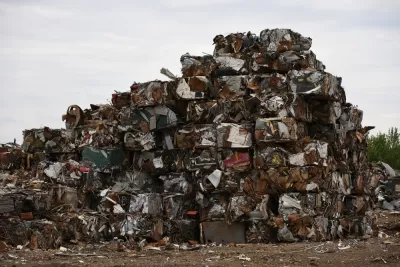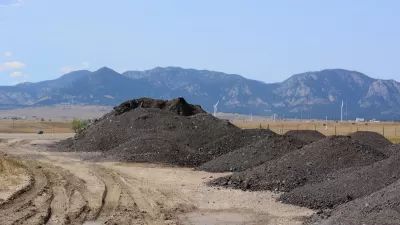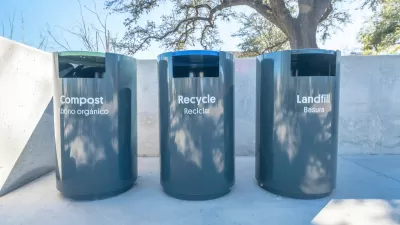A number of U.S. cities have set ambitious zero-waste goals, but reaching targets has been challenging. Turning waste into a viable commodity is one strategy to get materials out of the waste stream.

James A. Anderson takes a closer look at cities working to meet zero-waste targets, particularly efforts to commodify waste materials. Cities including San Francisco, Austin, and New York are struggling to reach their goals because of budget limitations, rising costs, and decreasing disposal options.
One approach has been economic development that seeks to remove trash from the waste stream. Austin’s 2011 zero-waste plan lays out strategies for diverting 90 percent of waste from landfills and incinerators by 2040. The city also has focused on commercial waste, which makes up a significant proportion of Austin's overall trash output. The [Re]Verse Pitch Competition is one attempt to engage entrepreneurs in waste disposal efforts, says Anderson:
The competition’s challenge is to devise a business plan that makes something marketable out of heaps of trash that nearby companies and nonprofits are eager to donate to the cause. In past years, starter donations have included expired canned goods from a food pantry, damaged pressboard furniture, distillery dregs, and even a mound of used mesh delivery bags.
The city has also put resources into the Austin Materials Marketplace, an online platform to link businesses and organizations with waste materials they can use and that otherwise would likely end up in landfills.
"Creating bonafide demand for plastic, paper, glass, food waste and other materials removed completely out of Austin’s garbage would not only give those programs a financial boost, it would transform zero-waste programs from budgetary burdens to possible economic boons," notes Anderson.
FULL STORY: Can Cities Ever Reach Absolute Zero (Waste)?

Maui's Vacation Rental Debate Turns Ugly
Verbal attacks, misinformation campaigns and fistfights plague a high-stakes debate to convert thousands of vacation rentals into long-term housing.

Planetizen Federal Action Tracker
A weekly monitor of how Trump’s orders and actions are impacting planners and planning in America.

In Urban Planning, AI Prompting Could be the New Design Thinking
Creativity has long been key to great urban design. What if we see AI as our new creative partner?

King County Supportive Housing Program Offers Hope for Unhoused Residents
The county is taking a ‘Housing First’ approach that prioritizes getting people into housing, then offering wraparound supportive services.

Researchers Use AI to Get Clearer Picture of US Housing
Analysts are using artificial intelligence to supercharge their research by allowing them to comb through data faster. Though these AI tools can be error prone, they save time and housing researchers are optimistic about the future.

Making Shared Micromobility More Inclusive
Cities and shared mobility system operators can do more to include people with disabilities in planning and operations, per a new report.
Urban Design for Planners 1: Software Tools
This six-course series explores essential urban design concepts using open source software and equips planners with the tools they need to participate fully in the urban design process.
Planning for Universal Design
Learn the tools for implementing Universal Design in planning regulations.
planning NEXT
Appalachian Highlands Housing Partners
Mpact (founded as Rail~Volution)
City of Camden Redevelopment Agency
City of Astoria
City of Portland
City of Laramie




























